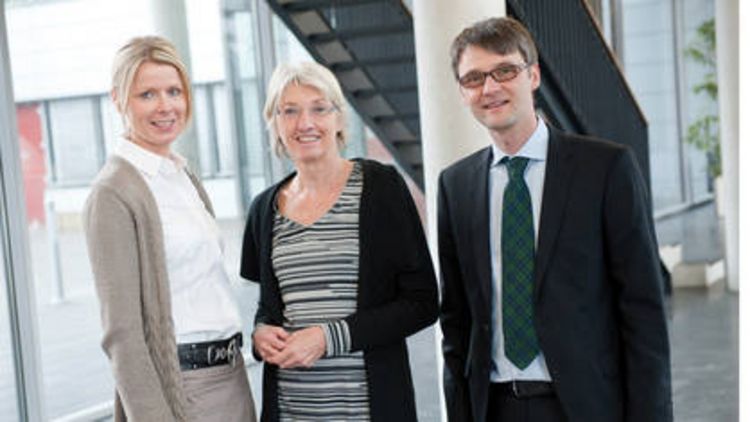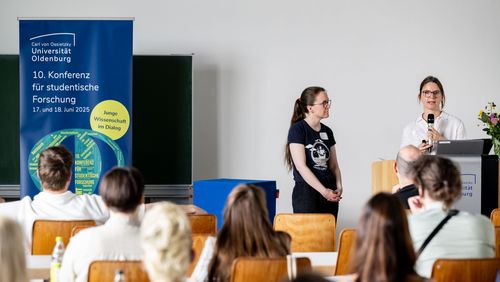Germany suffers from a lack of university graduates. One reason why Germany is lagging behind in this respect compared to other countries is that German universities are insufficiently oriented towards the requirements of lifelong learning.
Anke Hanft, Heinke Röbken and Olaf Zawacki-Richter
German universities are still geared towards what is regarded as the "traditional student". He or she begins their undergraduate studies after gaining their university entry qualification, and once they have obtained their Master‘s degree they seek employment.
The Organisation for Economic Co-operation and Development (OECD) has long since charted out a different course. It recommends increasing the number of people gaining degrees by giving other groups access to higher education. For example those who are qualified to study but come from low-income and less-educated families, or people who already have professional qualifications and want to study for a degree.
However in the undergraduate study programmes prevalent throughout Germany, cases of students who are in full-time employment parallel to their studies are rare. A student‘s studies must take priority over employment, and any work should be limited to the vacations. The general rule is: full-time study according to the semester schedule with the obligation to attend courses throughout the week. Few universities award credits for job-related skills or develop degree courses that are tailored to the requirements of people in employment. The German higher education system recognises only one perfect path to a successful university degree: the "Abitur", Germany‘s formal university entry qualification.
Yet this orientation towards the "traditional student" has long since ceased to correspond to the reality of the situation. According to a social survey by the Deutsches Studentenwerk and the Hochschul-Informations-System published in 2010, the proportion of students in Germany with work experience is – at 64 percent – actually above the international average. Almost a quarter of all students have already completed a vocational training course before they begin their university studies. In 1999, 66 percent of all students jobbed "on the side". And the number of students who work in addition to studying rises in proportion to their age, reaching 79 percent among 30-year-olds.
Clearly then, work and study are far more interconnected than the universities are willing to recognise, even though the number of working students and students with professional experience will continue to rise. Given the opportunity, many graduates will start working after gaining their Bachelor‘s degree and only later – while still working – return to university to study for their Master‘s.
This orientation towards "the traditional student" has long since ceased to correspondend to the reality
University policy and the universities themselves must be much better prepared to meet the changed requirements of their current target groups as well as those of new groups. Policymakers have taken the first steps in this direction. In 2009, the Standing Conference of the Ministers of Education (Kultusministerkonferenz) passed a resolution that broadens access to higher education. Since then individuals with a master craftsman‘s diploma, technicians, qualified professionals in commercial or financial occupations and holders of equivalent qualifications have general access to higher education, while individuals with basic vocational qualifications are entitled to take degree courses in certain subjects.
As far as the German education system is concerned these regulations are more than adequate. University researcher Andrä Wolter estimates that approximately 75 percent of Germany‘s population is now qualified to study in higher education. A student who has completed the ´Abitur´ sitting next to a gardener studying biology or an interior decorator who has decided to take a degree in material culture – this is the kind of scenario we must be prepared for in future.
In order to make higher education more attractive to people in employment, the Standing Conference, in line with the directives of the Bologna Process, created the conditions for further reform as early as 2002 – however universities are largely unaware of this. According to a Standing Conference structural guideline that applies in all the German states and was passed on 4 February 2010,"proven competence and skills acquired outside of the higher education system (…) can be counted as credits for up to half the total amount of credits required for a given degree course." In other words: professionals can have their professional skills accredited towards their degrees in as far as their skills correspond to degree requirements. This means that in the best case those with career experience can see their period of study halved.
But what sounds like a major breakthrough for people in employment who want to study is in practice littered with obstacles. First there are fixed quotas that limit the number of students with work experience who are allowed to enrol for programmes with admissions restrictions. But far more critical is the fact that the degree courses are simply not tailored to the requirements of people in employment.
With the Lifelong Learning Campus the University assumes a pioneering role.
Empirical studies have long since shown that it is not enough to open up universities to new target groups, the process initiated with the resolutions of the Standing Conference of Ministers of Education. Additional supportive measures are required. We need advisory and supervision services to be available both before the course of study begins and in the initial phase of study. Equally important are flexible study structures that are adjusted to the time limits and experience of employed students and students who have already acquired professional experience.
Instead of focusing on prescribed periods of study, the semester rhythm and timetables we need to get rid of spatial and temporal limitations on higher education. Students should be able to organise their studies flexibly and according to their educational requirements – ideally without being bound to a single university.
The University of Oldenburg is one of the few universities in Germany that has already taken many steps towards putting all this into practice. It has established degree courses that are consistently oriented towards the learning requirements of people who work parallel to their studies. Students can have their professional skills accredited towards certain courses of study. And with our successful participation in the Advancement through Education: Open Universities" competition organised by the Federal Ministry of Education and Research (BMBF) we will also develop high-quality degree programmes in the fields of science and technology that are tailored to the needs of working students. By offering Master programmes in the fields of renewable energies, wind energy systems, environmental sciences, building physics and acoustics the University is also specifically targeting professionals and people with family obligations.
Since the end of last year, with the new Lifelong Learning Campus the University also provides a space specially designed to cater to the needs of working students – thus assuming a pioneering role in Germany‘s university landscape. The new campus incorporates all the institutions that deal with issues pertaining to continuing education and lifelong learning in their research and teaching. The Centre for Lifelong Learning (C3L) is among the largest facility of its kind at a German university and provides well-researched, practice-oriented study programmes for working students.
By offering such degree programmes the University aims to increase the interchange between vocational training and higher education and attract new target groups to universities via flexible educational paths. By focusing the research and teaching resources of academic continuing education at the Lifelong Learning Campus, the University of Oldenburg has taken a major step towards realising the goal of lifelong learning and putting it into practice.
However lifelong learning is a subject that is relevant for all universities, not just Oldenburg. Lifelong learning must become an integral part of the entire higher education system. If state-run universities fail to take up this challenge they will lose competitiveness. There is the danger that in the long term the deficits exposed by the OECD will not only weaken state-run universities, but also the competitiveness of Germany as a whole.







